The Nursing Home Law Center is committed to providing the legal resources necessary to hold negligent facilities accountable.
Illinois Nursing Home Abuse Lawyer

Licensed in Illinois
The impact of nursing home abuse on elderly residents can be profound, often leading to physical injuries, emotional distress, and a decline in overall health. This abuse, a betrayal of the duty of care, can tragically shorten the lives of these individuals.
At Nursing Home Law Center, LLC, our nursing home abuse lawyers are dedicated to addressing this critical issue. We provide thorough legal support to victims and their families, ensuring that those responsible for such abuse are held accountable and that justice is served.
Addressing the Epidemic of Nursing Facility Abuse in Illinois
Abusive behavior in Illinois has become an alarming issue, demanding immediate and informed legal action. This widespread problem not only undermines the dignity of our elders but also poses a significant health challenge. Each Chicago nursing home abuse attorney on our legal team is dedicated to confronting this crisis, providing legal expertise and advocacy to safeguard the rights of the vulnerable.
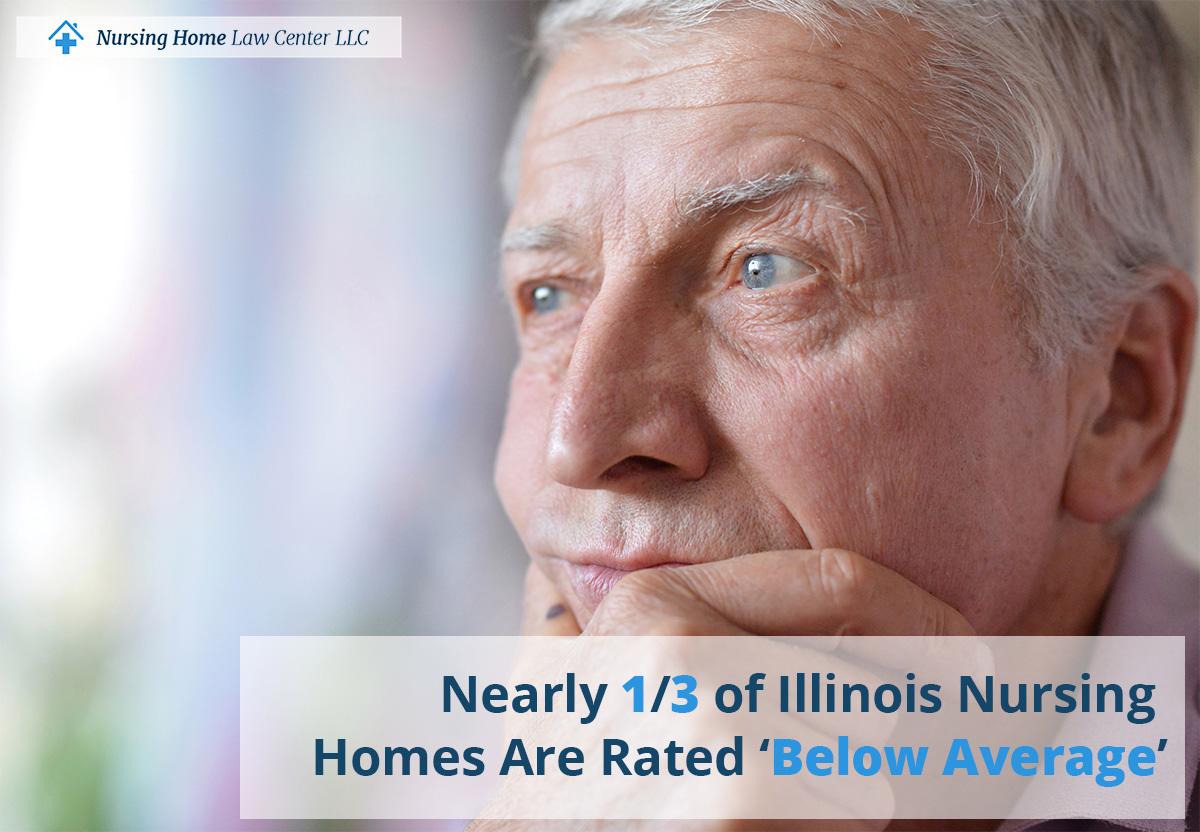
The Growing Concern of Elder Abuse
In recent years, Illinois has witnessed a disturbing rise in elder abuse cases, particularly in senior care homes. Illinois, unfortunately, reports a higher number of nursing abuse cases than many other states. This trend indicates a systemic failure in providing safe and compassionate care for the elderly. This increase calls for heightened awareness and legal intervention.
Inspections to Counter Alarming State of Illinois Senior Care Homes
In collaboration with state agencies, the Centers for Medicare and Medicaid Services (CMS) rigorously conduct annual inspections of all Illinois nursing facilities. These inspections are a pivotal component of regulatory oversight, ensuring facilities comply with federal and state standards for quality care.
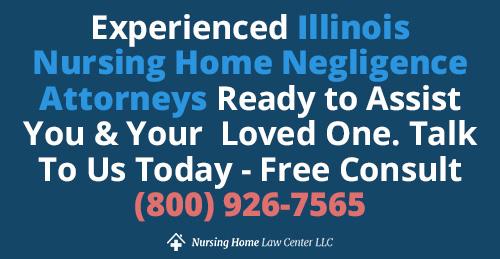
Purpose and Scope of Inspections
The objective of these inspections is multifaceted: they assess the level of care provided, the adherence to safety protocols, and the overall living conditions of the residents. Inspectors evaluate critical factors, including:
- Staffing ratios
- Nutritional services
- Medical care quality
- Physical condition of the buildings
The Role of Surveyors and Inspectors
Surveyors and inspectors are crucial in enforcing care standards within senior care homes. They are trained professionals evaluating care quality, resident rights, and facility conditions, ensuring that caregiving homes meet or exceed the required care standards.
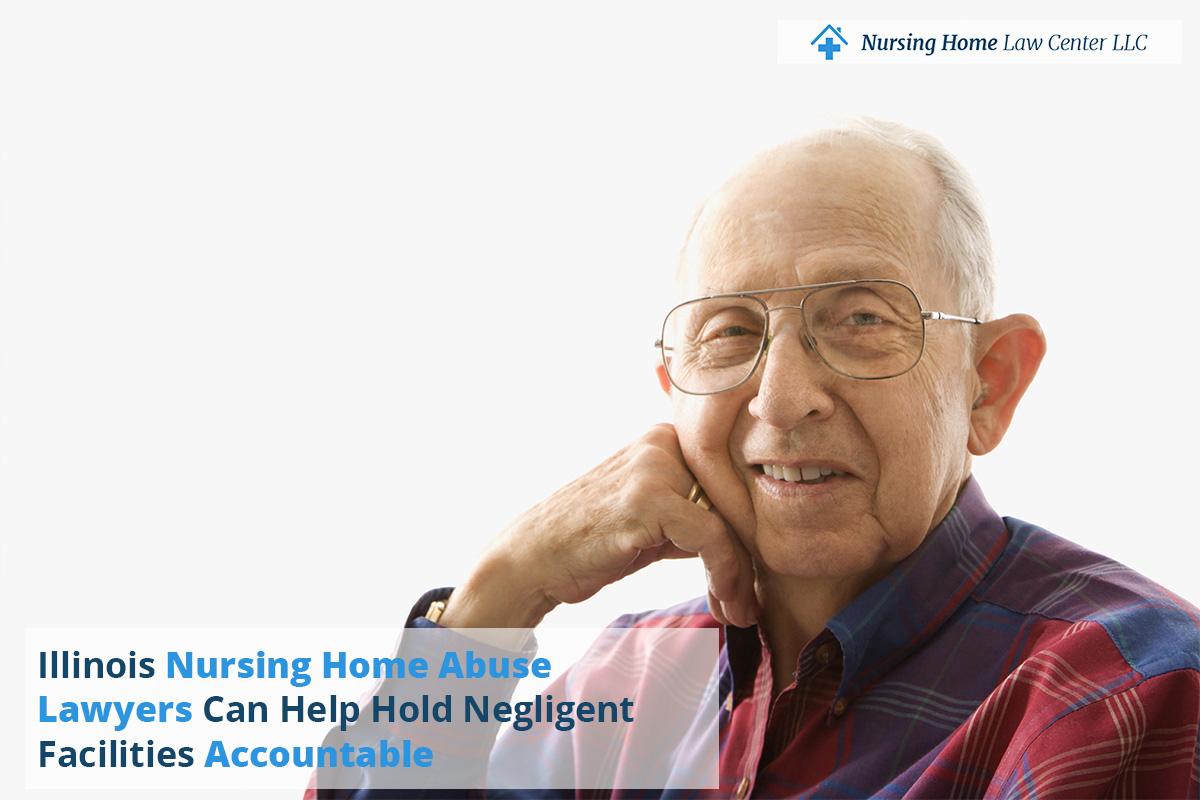
The Response to Non-Compliance and Abuse: Addressing Violations
Upon discovering violations, investigative agencies respond with appropriate measures designed to rectify the situation and prevent future occurrences such as:
- Providing guidance for improvement
- Monitoring compliance
- When necessary, imposing sanctions
Nursing Home Statistics in Illinois: CMS Ratings
In January 2024, the Centers for Medicare and Medicaid Services (CMS) updated findings, revealing valuable insights into the quality of care and services provided by these facilities.
The CMS ratings revealed a sobering reality for nursing homes in Illinois. Out of the 683 caregiving homes assessed, a staggering 368 of them, which accounts for approximately 63%, received ratings classified as “below average” or “much below average.” These ratings reflect the quality of care and services offered in these facilities, raising concerns about the well-being of residents and the level of attention they receive.
Implications for Residents
For individuals with loved ones residing in senior care homes in Illinois, these statistics are a cause for concern. Awareness of the CMS ratings is crucial when selecting a nursing home for your family member. Facilities with below-average or much-below-average ratings may have neglect, abuse, or substandard care issues, which can have severe consequences for residents.
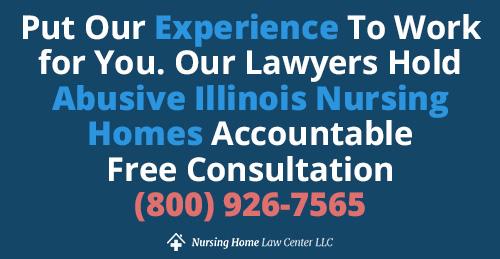
Protecting Residents From Abuse
When abuse or severe neglect is found, swift action is taken to protect the residents. This can involve legal action against the facility and its employees and immediate measures to ensure the safety and well-being of the nursing home residents. The safety and dignity of nursing home residents hinge on the effectiveness of these regulatory measures.
Recognizing and Responding to Abuse in Illinois Caregiving Homes
It is crucial to recognize and promptly address signs of abuse. Awareness of these signs is the first step towards protecting our elderly family members. The Illinois nursing home abuse attorney team plays a pivotal role in responding to these incidents, ensuring justice and care for the victims.
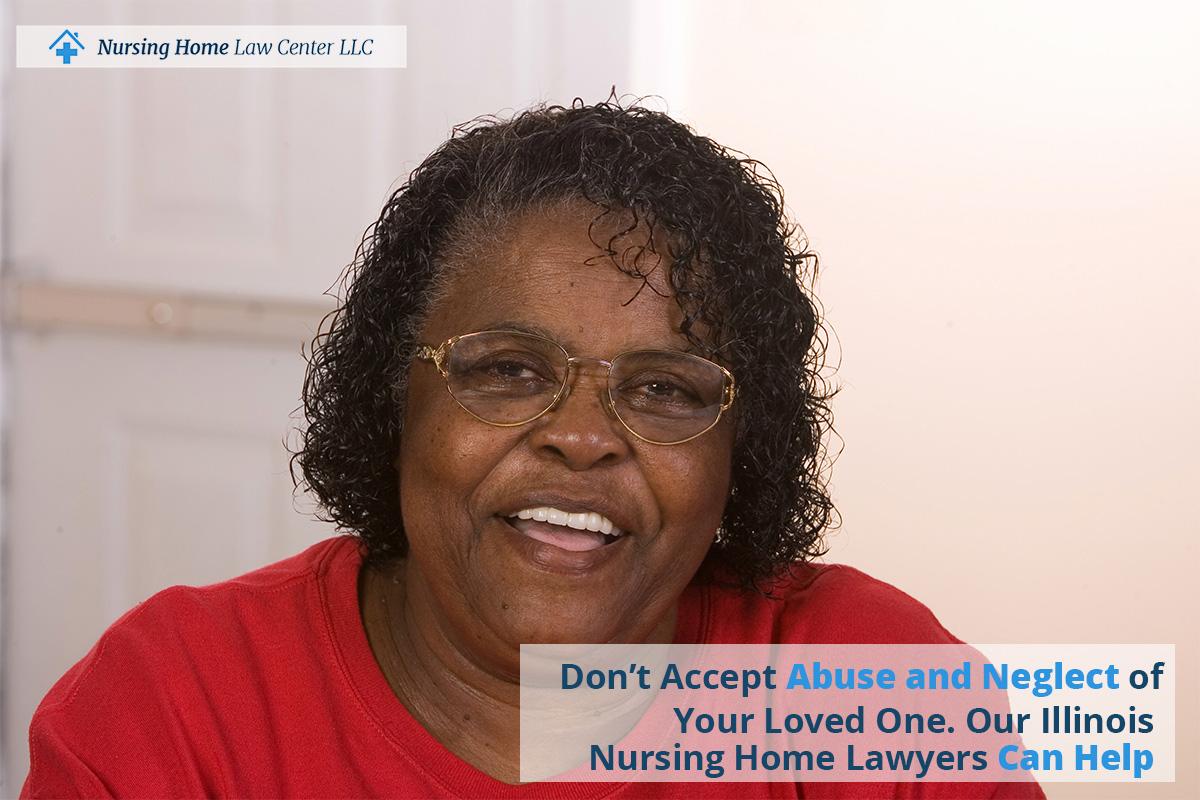
Identifying Signs of Neglect and Abuse
Recognizing abuse in caregiving homes is vital for timely intervention. Common indicators which are alarmingly prevalent in Illinois nursing home facilities include:
- Bedsores
- Frequent falls
- Recurring infections
Awareness of these signs enables families and caregivers to take necessary legal steps.
Understanding the Complexity of Nursing Abuse in Illinois
Nursing abuse in Illinois is a complex issue, influenced by various demographic and legal factors. Understanding these intricacies is essential for effective legal representation and advocacy.
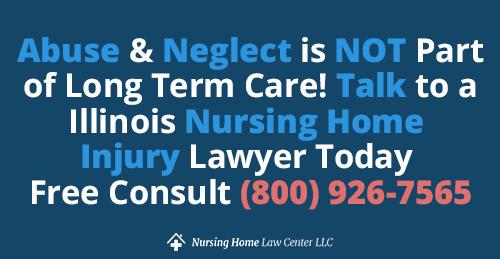
Demographic Challenges and Understaffing Issues
Understaffing in Illinois nursing facilities is a significant challenge, often leading to neglect and abuse. The demographic shift towards an aging population further exacerbates this issue, stressing the importance of addressing these staffing shortages to improve care quality.
Laws Governing Professional Caregivers
A combination of federal and state laws governs the operation of caregiving homes in Illinois. These regulations are designed to protect the residents and ensure adequate care. Our law firm is well-versed in these legal frameworks, enabling us to advocate effectively for our clients.
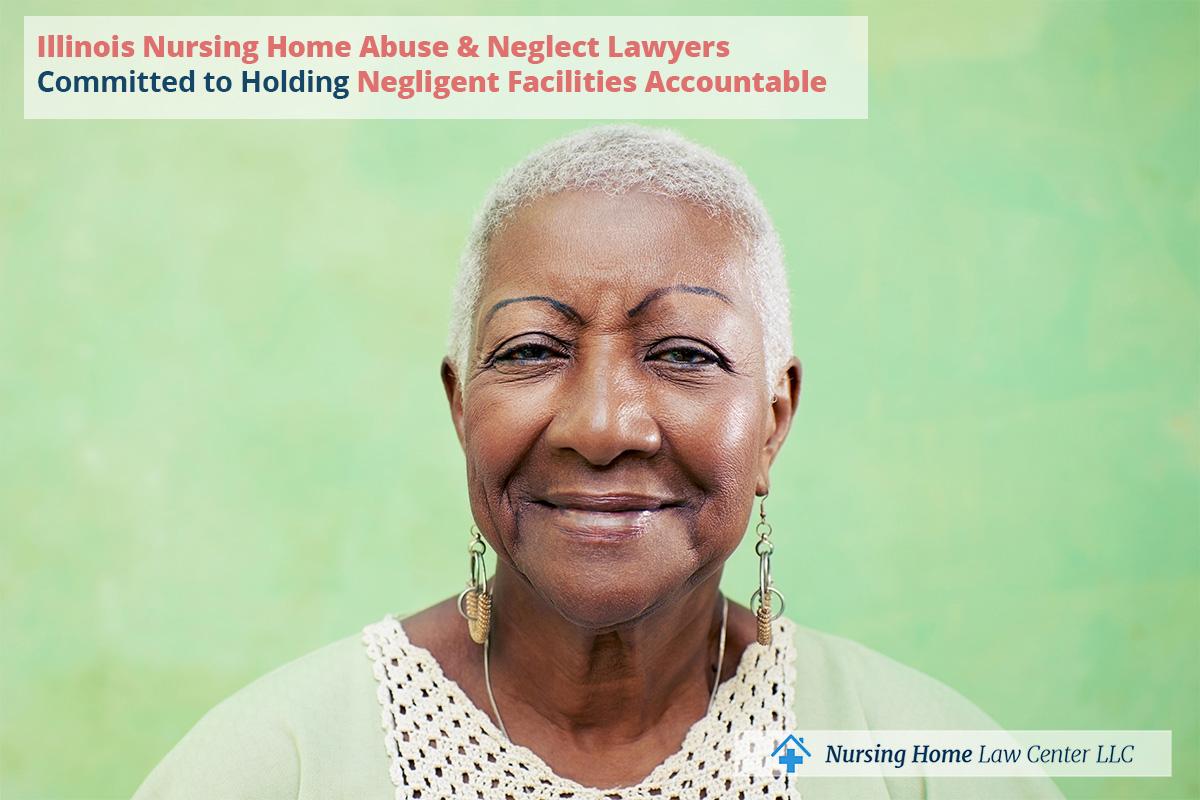
Residents’ Rights in Illinois Nursing Facilities
Nursing residents in Illinois are entitled to various rights, including financial autonomy, the right to personal property, and freedom from unnecessary restraints. Our attorneys are committed to ensuring these rights are respected and upheld.
The U.S. Nursing Home Reform Act and the Illinois Nursing Home Care Act are key legislation governing caregiving facilities. These laws establish standards for care and protect residents from abuse and neglect.
Definition and Types of Abuse
Understanding the various forms of abuse and neglect is crucial in identifying and addressing these issues in caregiving homes. This knowledge helps in providing comprehensive legal support to victims.
- Physical Abuse: Involves intentional use of force causing pain, injury, or distress.
- Sexual Abuse: Includes forced or unwanted sexual interaction.
- Emotional and Psychological Abuse: Verbal and nonverbal behaviors causing mental distress.
- Neglect: Failure to meet the basic needs of the elderly.
- Financial Abuse: Illegal or unauthorized use of an elder’s finances or property.
Specific Challenges Faced by Illinois Nursing Home Residents
Senior care residents in Illinois face unique challenges that can lead to abuse and neglect. Addressing these issues is essential for ensuring their safety and well-being.
- Negligence Leading to Malnutrition and Bedsores: Negligence in caregiving homes can result in malnutrition, dehydration, and the development of bedsores among residents. These conditions are often indicators of inadequate care and require immediate legal attention.
- Risks of Falls and Alzheimer’s Mistreatment: Falls and the mistreatment of residents with Alzheimer’s disease are significant risks in nursing facilities. These issues highlight the need for improved care standards and vigilant legal oversight.
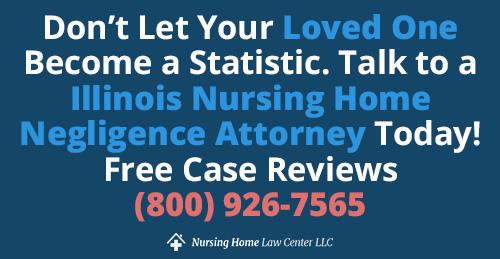
Legal Options and Rights for Nursing Home Abuse Victims
Abused victims in Illinois have several legal options and rights. Understanding these is crucial for pursuing justice and obtaining appropriate compensation.
- Filing a Nursing Home Abuse Lawsuit in Illinois: Our law firm guides clients through the process of filing a civil lawsuit in Illinois. We outline who can file a lawsuit and the steps involved, ensuring that our client’s legal rights are fully exercised.
- Compensation and Damages in Abuse Cases: Abused victims can claim various damages, including medical expenses, pain and suffering, and punitive damages. Our attorneys are ski lled in securing fair compensation for our clients, reflecting the severity of the abuse and its impact.
Reporting Nursing Home Neglect
Reporting negligence is critical to protecting residents and preventing further abuse. Our law firm plays a key role in facilitating these processes.
We provide comprehensive guidance on reporting nursing home neglect in Illinois. This includes outlining the steps to report abuse and ensuring that the authorities take the reports seriously.
- Department of Human Services OIG Hotline: For abuse or neglect of persons with mental illness or developmental disabilities at DHS-operated facilities, call 1-800-368-1463.
- Senior HelpLine: Suspected abuse or neglect can be reported at (800) 252-8966 or (888) 206-1327 (TTY).
- Illinois Department of Public Health (IDPH): File a complaint directly with IDPH at 1-800-252-4343 or 1-800-547-0466 for nursing abuse or neglect.
- IDPH Nursing Complaint Hotline: For nursing facility residents, reports can be made by calling 1-800-252-4343.
Protecting Your Loved Ones: Prevention and Advocacy
Preventing negligence and abuse and advocating for better care are essential aspects of our work. We strive to empower families and improve the overall standard of nursing home care in Illinois.
- Choosing the Right Nursing Facility: Selecting a nursing home for a loved one is a significant decision. Our legal firm provides legal guidance on choosing facilities with strong track records of delivering quality care.
- Advocacy for Better Caregiving: Our lawyers play a crucial role in advocating for higher standards of care in caregiving homes. We work alongside families and policymakers to push for reforms prioritizing nursing home residents’ health and dignity.
Illinois Nursing Home Abuse Frequently Asked Questions
At Nursing Home Law Center, LLC, we understand that navigating the complexities of elder abuse cases can be overwhelming. Our experienced Illinois nursing home abuse attorney team has diligently addressed the most common inquiries brought to our attention.
From understanding the legal process to recognizing the signs of abuse, we aim to provide you with the knowledge and resources needed to make informed decisions. Were you or a loved one affected by abuse or neglect? Our Illinois nursing home neglect legal team is ready to stand by your side, fighting tirelessly to protect your rights and seek the compensation you deserve.
Hiring Our Personal Injury Law Firm to Obtain Justice for Nursing Home Abuse Victims
Our law firm is dedicated to securing justice for victims of nursing facility abuse. We are committed to providing compassionate and effective legal representation to protect victims’ rights.
Committed to Your Loved One’s Dignity and Rights
At our law firm, we prioritize the dignity and rights of nursing home abuse victims. We work tirelessly to seek justice and fair compensation for the harm suffered. Our approach combines legal expertise with a deep understanding of the challenges of nursing home residents and their families.
Nursing facility abuse is a serious issue that requires immediate and knowledgeable legal intervention. Each Illinois nursing home abuse attorney of our Chicago legal team is equipped to handle these complex cases, providing the necessary support and guidance to victims and their families.
We advocate tirelessly for the rights of the elderly and seek to hold negligent nursing homes accountable, ensuring a safer future for all nursing home residents. Call our nursing home lawyers at (800) 926-7565 to schedule a free case consultation.

